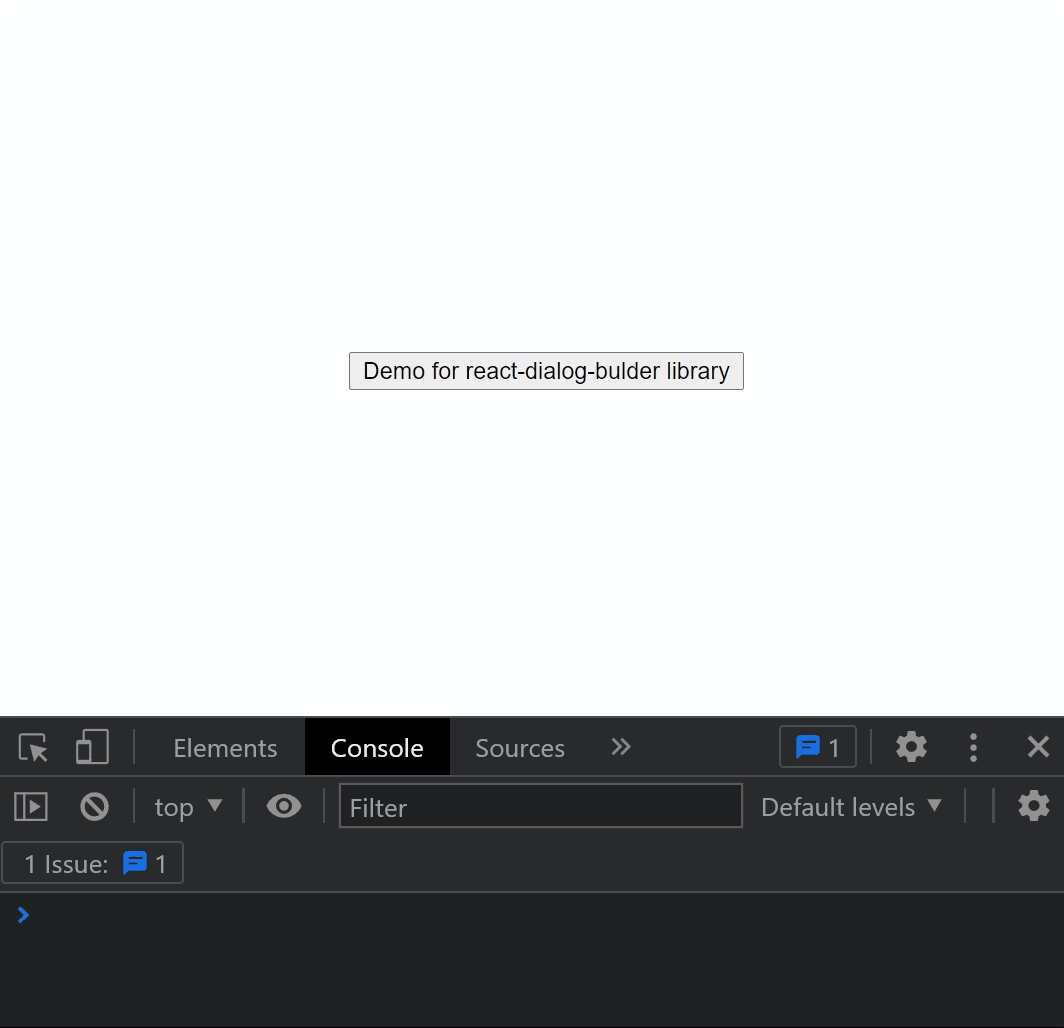react-dialog-builder
v1.0.1
Published
This library provides an easy and convenient programmatic approach to render anything as a dialog
Downloads
4
Maintainers
Readme
This library allows programmatic creation of dialogs instead of using states which is often time a little inconvenient and results in quite a bit of boilerplate, its minimal, yet powerful API lets you render anything as a dialog, in additional to that, the CSS required for each created dialog is simple with no deeply nested selectors allowing you to easily style your dialogs anyway you want to fit your needs.
Why do you want to programmatically create dialogs? The short answer is simplicity, the long answer is because dialogs are on-demand components, you don't want them to appear inside your DOM tree until you need them which results in less bloated HTML, in additional to that, you don't have to create and maintain a new state to manage the dialog's life cycle (showing and closing the dialog)
Installation
npm i -S react-dialog-builderSetting up
import { DialogBuilder } from 'react-dialog-builder';
// This is necessary because this library relies on a few CSS rules
import 'react-dialog-builder/light.css';
// or import 'react-dialog-builder/dark.css';Available APIs
class DialogBuilder {
/**
* The entry point to the `DialogBuilder` APIs
*
* @param content The component's JSX to render
* @returns A new dialog builder instance
*/
static newDialog(content: ReactNode): DialogBuilder;
/**
* Adds another class name for this dialog, newly added class names are
* concatenated instead of replacing previous ones.
*
* @param value The new class name to add
* @returns This dialog builder instance
*/
addClassName(value: string): DialogBuilder;
/**
* Sets whether this dialog can be closed by clicking on the backdrop, `false` by default
*
* @returns This dialog builder instance
*/
dismissible(): DialogBuilder;
/**
* Sets whether the backdrop should be transparent, `false` by default
*
* @returns This dialog builder instance
*/
transparentBackdrop(): DialogBuilder;
/**
* Opens the currently configured dialog, returns a dialog reference object that includes methods
* to close this dialog or to set a callback to be invoked after the dialog is closed
*
* @returns A {@link DialogRef} object
*/
open(): DialogRef;
}/**
* Represents an object that contains a reference to the opened dialog which allows
* closing the dialog or setting a callback to be invoked after the dialog is closed
*/
interface DialogRef {
/**
* Manually close this dialog
*/
close(): void;
/**
* Sets the callback to be invoked after the dialog is closed.
*/
runAfterClosed(fn: () => void): void;
}
Using DialogBuilder
DialogBuilder contains a single entry point via the static method called newDialog which returns a new DialogBuilder. It uses the fluent interface pattern to make the APIs more friendly to develop with.
Code example
import { DialogBuilder } from 'react-dialog-builder';
import 'react-dialog-builder/light.css';
function App() {
const openDialog = () => {
const dialogRef: DialogRef = DialogBuilder.newDialog(
<div style={{
display: 'flex',
flexFlow: 'column nowrap',
alignItems: 'flex-end',
backgroundColor: '#fff',
padding: '5px 20px 15px',
borderRadius: 4,
fontFamily: 'Helvetica Neue'
}}>
<p>Creating dialogs can never be easier</p>
<button
type='button'
style={{
marginTop: 10
}}
onClick={() => {
// Use the returned `DialogRef` object to close the dialog manually
dialogRef.close();
}}>
Close
</button>
</div>
)
// Calling this method will make clicking on the backdrop close this dialog
.dismissible()
// The final step in configuring this dialog which returns a `DialogRef`
// object allowing you to close this dialog instance or to set a callback to
// be invoked after the dialog is closed
.open();
// The returned `DialogRef` object contains a method to set a callback to be
// invoked right after the dialog is closed
dialogRef.runAfterClosed(() => console.info('Dialog was closed'));
};
return (
<button onClick={openDialog}>Demo for react-dialog-builder library</button>
);
}Result

